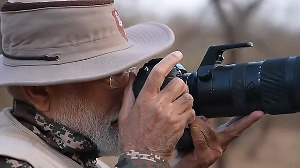It was Ibrahim who was initially characterised by press reports as being the mastermind behind the attacks. Now, that title is being given to Zaki-ur Rehman Lakhvi by numerous media accounts reporting that Pakistan security forces have raided a training camp of the group Lashkar-e-Tayiba, which evidence has indicated was behind the attacks. Lakhvi was reportedly captured in the raid and is now in custody.
At the same time Ibrahim's role is being downplayed, Lakhvi's known role is being exaggerated. Initial reports described him as the training specialist for LeT, but the major media outlets like the New York Times and the London Times, citing government sources, have since promoted his status to that of commander of operations for the group.
The only terrorist from the Mumbai attacks to be captured alive, Ajmal Amir Kasab, characterised Ibrahim, not Lakhvi, as the mastermind of those attacks, according to earlier press accounts.
Kasab reportedly told his interrogators that he and his fellow terrorists were trained under Lakhvi, also known as Chacha (uncle), at a camp in Pakistan. Indian officials also traced calls from a satellite phone used by the terrorists to Lakhvi.
But the phone had also been used to call Yusuf Muzammil, also known as Abu Yusuf, Abu Hurrera, and "Yahah". And it has been Muzammil, not Lakhvi, who has previously been described as the military commander of the LeT. It was an intercepted call to Muzammil on November 18 that put the Indian Navy and Coast Guard on high alert to be on the lookout for any foreign vessels from Pakistan entering Indian waters.
Kasab told his interrogators that his team had set out from Karachi, Pakistan, on a ship belonging to Dawood Ibrahim, the MV Alpha. They then hijacked an Indian fishing trawler, the Kuber, to pass through Indian territorial waters to elude the Navy and Coast Guard that were boarding and searching suspect ships.
Although the MV Alpha was subsequently found and seized by the Indian Navy, there have been few, if any, developments about this aspect of the investigation in press accounts, such as whether it has been confirmed or not that the ship was owned by Ibrahim.
Upon arriving off the coast near the city, they were received by inflatable rubber dinghies that had been arranged by an associate of Ibrahim's in Mumbai.
The planning and execution of the attacks are indicative of the mastermind role not of either Lakhvi or Muzammil, but of Ibrahim, an Indian who is intimately familiar with the city. It was in Mumbai that Ibrahim rose through the ranks of the underworld to become a major organised crime boss.
At least two other Indians were also connected to the attacks, Mukhtar Ahmed and Tausef Rahman. They were arrested for their role in obtaining SIM cards used in the cell phones of the terrorists. Ahmed, according to Indian officials, had in fact been recruited by a special counter-insurgency police task force as an undercover operative. His exact role is still being investigated.
One of the SIM cards used was possibly purchased from New Jersey. Investigators are looking into this potential link to the US, as well.
Dawood Ibrahim went from underworld kingpin to terrorist in 1993, when he was connected to a series of bombings in Mumbai that resulted in 250 deaths. He is wanted by Interpol and was designated by the US as a global terrorist in 2003.
It Is believed Ibrahim has been residing in Karachi, and Indian officials have accused Pakistan's ISI of protecting him.
Ibrahim is known to be a major drug trafficker responsible for shipping narcotics into the United Kingdom and Western Europe.
According to the United Nations Office on Drugs and Crime, most Afghan opium (or its derivative, heroin, which is increasingly being produced in the country before export) is smuggled through Iran and Turkey en route by land to Europe; but the percentage that goes to Pakistan seems to mostly find its way directly to the UK, either by plane or by ship.
Afghanistan is the world's leading producer of opium, a trend that developed during the CIA-backed mujahedeen effort to oust the Soviet Union from the country, with the drug trade serving to help finance the war.
A known drug trafficker, Dawood Ibrahim is naturally also involved in money laundering, which is perhaps where the role of gambling operations in Nepal comes into the picture.
Yoichi Shimatsu, former editor of the Japan Times, wrote last month after the Mumbai attacks that Ibrahim had worked with the US to help finance the mujahedeen during the 1980s and that because he knows too much about the US's 'darker secrets' in the region, he could never be allowed to be turned over to India.
The recent promotion of Lakhvi to 'mastermind' of the attacks while Ibrahim's name disappears from media reports would seem to lend credence to Shimatsu's assertion.
Investigative journalist Wayne Madsen similarly reported that according to intelligence sources, Ibrahim is a CIA asset, both as a veteran of the mujahedeen war and in a continuing connection with his casino and drug trade operations in Kathmandu, Nepal. A deal had been made earlier this year to have Pakistan hand Ibrahim over to India, but the CIA was fearful that this would lead to too many of its dirty secrets coming to light, including the criminal activities of high level personnel within the agency.
One theory on the Mumbai attacks is that it was backlash for this double-cross that was among other things intended to serve as a warning that any such arrangement could have further serious consequences.
Although designated as a major international terrorist by the US, media reports in India have characterised the US's past interest in seeing Ibrahim handed over as less than enthusiastic. Former Indian deputy prime minister L K Advani wrote in his memoir, My Country, My Life, that he made a great effort to get Pakistan to hand over Ibrahim, and met with then US secretary of state Colin Powell and then national security advisor Condoleezza Rice (now secretary of state) to pressure Pakistan to do so. But he was informed by Powell that Pakistan would hand over Ibrahim only "with some strings attached" and that then Pakistani President Pervez Musharraf would need more time before doing so.
The handover, needless to say, never occurred. The Pakistan government has also publicly denied that Ibrahim is even in the country; a denial that was repeated following the recent Mumbai attacks.
Others suspected of involvement in the attacks and named among the 20 individuals India wants Pakistan to turn over also have possible connections to the CIA, including Hafiz Mohammad Saeed, the founder of LeT, and Jaish-e-Mohammed leader Maulana Masood Azhar, both veterans of the CIA-backed mujahedeen effort.
Azhar had been captured in 1994 and imprisoned in India for his role as leader of the Pakistani-based terrorist group Harkut-ul-Mujahideen. He was released, however, in 1999 in exchange for hostages from the takeover of Indian Airlines Flight 814, which was hijacked during its flight from Kathmandu, Nepal to Delhi, India and redirected to Afghanistan. After Azhar's release, he formed JeM, which was responsible for an attack on the Indian Parliament in 2001 that led Pakistan and India to the brink of war. LeT was also blamed for the attack alongside JeM.
Both LeT and JeM have links to the ISI, which has used the groups as proxies in the conflict with India over the territory of Kashmir.
Saeed travelled to Peshawar to join the mujahedeen cause during the Soviet-Afghan war. Peshawar served as the base of operations for the CIA, which worked closely with the ISI to finance, arm, and train the mujahedeen. It was in Peshawar that Saeed became the protege of Abdullah Azzam, who founded an organization called Maktab al-Khidamat along with a Saudi individual named Osama bin Laden.
MaK worked alongside the CIA-ISI operations to recruit Arabs to the ranks of the mujahedeen. The ISI, acting as proxy for the CIA, chose mainly to channel its support to Afghans, such as warlord Gulbaddin Hekmatyar. The US claims the CIA had no relationship with MaK, but bin Laden's operation, which later evolved into Al Qaeda, must certainly have been known to, and approved by, the CIA.
But there are indications that the CIA's relationship with MaK and Al Qaeda go well beyond having shared a common enemy and mutual interests in the Soviet-Afghan war. A number of Al Qaeda associates appear to have been protected individuals.
Another former head of the ISI is now being privately accused by the US of involvement with the group responsible for the Mumbai attacks, according to reports citing a document listing former ISI chief Lieutenant General Hamid Gul and four other former heads of Pakistan's intelligence agency as being involved in supporting terrorist networks. The individuals named have been recommended to the UN Security Council to be named as international terrorists, according to Pakistan's The News.
The document has been provided to the Pakistan government and also accuses Gul, who was head of the ISI from 1987 to 1989, of providing assistance to criminal groups in Kabul, as well as to groups responsible for recruiting and training militants to attack US-led forces in Afghanistan, including the Taliban.
Hamid Gul responded to the reports by calling the allegations hilarious. The US denied that it had made any such recommendations to the UN.
But the US has similarly accused the ISI of involvement in the bombing of India's embassy in Kabul last July. This was unusual not because of the allegation of an ISI connection to terrorism but because it was in such stark contrast with US attempts to publicly portray Pakistan as a staunch ally in its 'war on terrorism' when the country was under the dictatorship of Musharraf.
The US attitude toward Pakistan shifted once an elected government came to power that has been more willing to side with the overwhelming belief among the public that it is the 'war on terrorism' itself that has exacerbated the problem of extremist militant groups and led to further terrorist attacks within the country, such as the assassination of former prime minister Benazir Bhutto last year or the bombing of the Marriot Hotel in September. While the world's attention has been focused on the attacks in Mumbai, a bomb blast in Peshawar killed 21 and injured 90.
While the purported US document names Gul and others as terrorist supporters, another report, from Indian intelligence, indicates that the terrorists who carried out the attacks in Mumbai were among 500 trained by instructors from the Pakistan military, according to The Times. This training of the 10 known Mumbai terrorists would have taken place prior to their recent preparation for these specific attacks by the LeT training specialist Zaki-ur Rehman Lakhvi.
But while Lakhvi, Muzammil, and Hafiz Saeed have continued to be named in connection with last month's attacks in Mumbai, the name of Dawood Ibrahim seems to be either disappearing altogether or his originally designated role as the accused mastermind of the attacks being credited now instead to Lakhvi in media accounts.
Whether this is a deliberate effort to downplay Ibrahim's role in the attacks so as not to have to force Pakistan to turn him over because of embarrassing revelations pertaining to the CIA's involvement with known terrorists and drug traffickers that development could possibly produce isn't certain.
But what is certain is that the CIA has had a long history of involvement with such characters and that the US has a track record of attempting to keep information about the nature of such involvement in the dark or to cover it up once it reaches the light of public scrutiny.
Jeremy R Hammond is the editor of Foreign Policy Journal. Reproduced with kind courtesy of Foreign Policy Journal.






 © 2025
© 2025